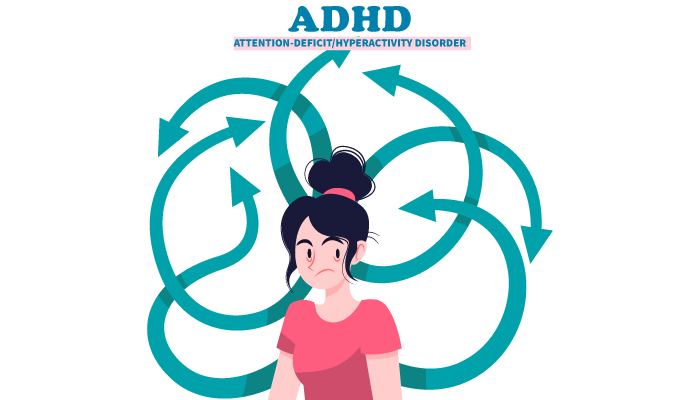The majority of the time, ADHD in children is easy to identify. However, adults sometimes exhibit subtler signs. As a result, a lot of people battle with ADHD and might not even be aware of it. They could be unaware of the connection between many of their issues, such as keeping organised or meeting deadlines, and ADHD. Time spent behind the steering wheel of a vehicle can be challenging if you have ADHD, which makes it difficult to maintain your focus on a task. Another problem which undiagnosed adult ADHD individuals face is relationships. Poor listening abilities and a failure to keep promises are often reported problems that they and their partner might face. This could also be indicative of ADHD adult’s partners thinking that their partner is uncaring.
Untreated ADHD can manifest as physiological and environmental variables that interfere with a person’s relationships and other parts of everyday life. So, in order to receive the right care, and go for online counselling, it’s crucial to understand the signs of adult ADHD.
Signs of ADHD in Adults
- Difficulty focusing, concentrating, and maintaining attention:
People with ADHD can focus on activities that are stimulating or interesting, but they struggle to maintain their attention and attend to routine activities. You can be easily distracted by unimportant sights and noises, switch between activities, or become bored rapidly. Because they are less obviously disruptive than the hyperactivity and impulsive symptoms of ADHD, symptoms in this group are frequently disregarded, although they can be just as problematic:
- Being readily distracted by external stimuli.
- Having trouble concentrating or paying attention, such as when reading or listening to others.
- Struggling to finish activities, even those that appear straightforward.
- A propensity to miss details, which can result in mistakes or unfinished work.
- Poor listening abilities, as seen in, for instance, difficulties recalling talks and following instructions.
- Fast onset of boredom and a need for novel, interesting activities.
- Disorganisation and Carelessness
An adult with ADHD may find it hard to manage their organizational skills. This can include finding it hard to keep track of their activities and prioritize them rationally. Keeping note of everything, prioritising your to-do list, your day-to-day chores and obligations, and managing your time are all difficult activities that may make it tough to stay organised and on top of things. The following are typical signs of forgetfulness and disorganisation:
- Lacking organisation skills
- Tendency to put things off
- Difficulty beginning and completing projects
- Continuous tardiness
- Frequently overlooking obligations, deadlines, and appointments
- Frequently misplacing or missing stuff
- Underestimating the length of time necessary to finish jobs
- Impulsive behaviour
Adults with ADHD could find it difficult to control their actions, words, and reactions. You can respond without thinking things through first or act without doing so. You can catch yourself speaking without thinking, making quick remarks, and completing jobs without reading the directions. It’s quite challenging to maintain patience if you struggle with impulsivity. You could go headfirst into events and end up in potentially dangerous situations, for better or worse.
Symptoms include:
- Inappropriate social behaviour
- Rushing through activities, and
- Behaving without much thought
- Emotional troubles
Many individuals with ADHD struggle to control their emotions, especially strong ones like anger or impatience. Adult ADHD emotional symptoms frequently include:
- Being easily agitated and anxious
- Anger or a short, frequently explosive temper
- Low self-esteem, uncertainty, and underperformance
- Problems maintaining motivation
- Being too sensitive to criticism
Even little irritations might appear overwhelming or trigger mood swings and sadness. Personal and professional connections may become more difficult if emotional issues go untreated.
- Hyperactivity or agitation
Adults with ADHD may exhibit the same symptoms of hyperactivity as children. You could seem extremely vivacious and always “on the move,” as if propelled by a motor. Adults with ADHD may get the sensation that their internal motors won’t turn off. Being impatient when you can’t act right away might result from your want to keep moving and taking action. This causes agitation, which can cause anger and worry. Adults may exhibit the same physical symptoms of anxiousness and restlessness as children, such as fidgeting. Few symptoms seen in Adult ADHD are they move about in their seat or stamping their feet, and becoming restless when asked to sit somewhere for a longer duration.
Get assessed by a qualified and experienced mental health practitioner/clinical psychologist if you believe you may have adult ADHD. It can be challenging to diagnose since certain potential symptoms, such as lack of motivation or attention or relationship issues, might also be indications of other illnesses. The signs of drug addiction or depression might be identical. Once you’ve been examined, you can take help from an Online Counsellor, and go for Online Counselling to feel better.
How can Online Counselling be helpful?
The format and objectives of in-person meetings are carried over to online counselling sessions. Online counselling is the term for mental health treatments delivered outside of a usual clinic, typically over the Internet and video calling on a platform that complies with HIPAA security regulations. But it goes farther than that. Additionally, online counsellors collaborate with patients via phone conversations, emails, messages, and freshly updated websites and applications that link people to mental health professionals. Many persons with ADHD experience additional issues such as low self-esteem, behavioural and interpersonal issues, and mood disorders because of symptoms including restlessness, executive impairment, and poor attention and concentration. Online Counselling is a crucial part of ADHD therapy since it may successfully address many of these issues.

